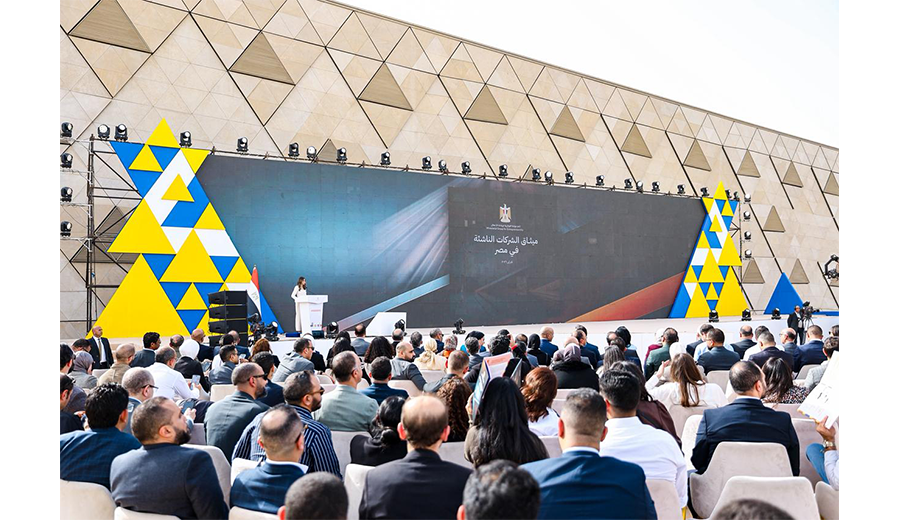Egypt Gov't to invest EGP 116.5 Bn in the agriculture sector in FY 2023/24 plan: Planning Minister

04 June 2023
H.E. Dr. Hala El-Said, Minister of Planning and Economic Development, reviewed today, sectoral programs, targets, and projects for the agriculture, water resources, and irrigation sectors, during the discussion of the report of the Financial, Economic, and Investment Affairs Committee regarding a draft law approving the economic and social development plan for the fiscal year 2023/2024, before the plenary session of the Senate.
Dr. Hala El-Said stated that the 2024/23 plan document provides a detailed presentation of the sectoral programs, including the targets, strategies, and initiatives that were based on them, noting that the priority productive sectors in the government program for structural reform, which are the sectors of agriculture, industry, and communications, contribute in total to about 35% of GDP.
El-Said touched on the objectives and projects of the agricultural sector, explaining that the plan estimates agricultural investments for the year 2024/23 at about EGP 116.6 billion, an increase of 71% over the expected investments for the year 2023/22, which amount to EGP 68 billion, and the sector’s contributions to the gross domestic product are estimated at 12 % in the plan year.
El-Said talked about the most important goals of agricultural development efforts, which include expanding the reclaimed lands by adding about 750,000 feddans within the framework of horizontal expansion projects in the new delta, which includes the projects of the future of Egypt, the paradise of Egypt, and the south of the Dabaa corridor, as well as the North and Central Sinai development project, and the development project Toshka El-Khair south of the valley, and the Egyptian Rural Development Project, bringing the cultivated area to nearly 10 million acres.
Regarding the vertical expansion programs, El-Said explained that they aim to improve the productivity of an acre of crops by rates ranging from 5% and 10%, by working to raise the efficiency of using the land and water units by developing field irrigation systems and agricultural drainage methods, following up that the 2024/23 plan aims to reach the total crop area is about 18 million feddans based on a crop density of 1.8 feddans, following up that the plan seeks to expand the areas allocated for wheat cultivation to reach 3.43 million feddans, corn cultivation to 2.8 million feddans, and fava beans to 220 thousand feddans.
Moreover, El-Said added that the plan also aims to increase self-sufficiency in wheat and corn to 50%, beans to 30%, red meat to 70%, and fish to 98%, while achieving an export surplus for many varieties of vegetable and fruit crops.
El-Said touched on the most critical quantitative targets of the programs supporting agricultural development, which include expanding the application of the contract farming system to include many basic crops, bringing the system’s output to 3.4 million tons in the year of the plan, compared to 1.2 million tons in 2014, as well as the expansion of the protected farming system within the framework of the national project to establish 100,000 greenhouses, with the addition of 900 greenhouses in the year of the plan to spread modern technologies and achieve water savings.
Furthermore, El-Said added that to enhance efforts to provide food security, the plan aims to increase logistical areas, commercial chains, regional warehouses, central markets, permanent exhibitions, and moving areas to expand the scope of distribution networks, in addition to raising the efficiency of the performance of the regulatory agencies, developing commercial registry offices, creating new offices, and opening branches of the Consumer Protection Agency in various governorates.
Within the framework of the development of livestock, El-Said confirmed that the plan pays attention to completing the implementation of the national project to revive veal, and the national project for dairy collection centers, which amount to 130 centers in 2023, of which 46 collection centers are being built within the scope of the first phase of the Decent Life Initiative, as well as expanding the establishment of slaughterhouses. It will reach three thousand slaughterhouses, complete the animal numbering and registration system, and activate the Livestock Insurance Fund.
El-Said added that within the framework of the 2024/23 plan, it is targeted to increase agricultural exports to reach $5.7 billion, compared to expected exports of $5.4 billion in 2023/22. This raises agriculture's contribution to total non-oil commodity exports to more than 15 percent.
Concerning the water resources and irrigation sector, El-Said explained that the plan aimed to implement several priority projects, the foremost of which is the project to complete the rehabilitation and lining of canals with a length of 2,400 km within the scope of the first and second phases of the Decent Life Initiative, as well as the modern field irrigation system project.
Lastly, El-Said added that among the targeted projects is the completion of the construction of a treatment plant with a capacity of 7.5 million m3/day, the water transmission path for land reclamation in areas south of the Dabaa axis, and the completion of a water transfer project with a capacity of 5 million m3/day from the Bahr El-Baqar drain to the east of the Suez Canal, as well as works infrastructure for the development of the Youth Canal, with a length of 53 km, in the Toshka region, and the establishment of (5) stations within the framework of the Egyptian Rural Development Project.
This is in addition to equipping 52 wells with solar energy, constructing 30 facilities to protect against the dangers of torrential rain and harvesting rainwater, replacing and renewing public and covered drainage networks within the control of 60,000 acres, and other works that the state is keen to implement, taking into account environmental sustainability standards and considerations.









